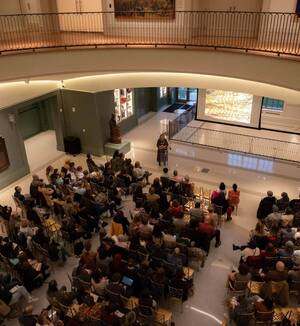 "
"
When Dr. Robin Wall Kimmerer started to speak, the first words out of her mouth were a quiet “thank you” and, after the briefest of pauses, “bozho ndénwemagnek:” hello, all my relatives. These words are not only a greeting, but an invitation — a call to recognize the interconnectedness of this world and the innumerable gifts it has given us and to reply with gratitude, with gifts of our own in return.
Kimmerer’s book “Braiding Sweetgrass” is all about this reciprocity. She explains that nature gives us so much; the only thing one can do in the face of such profound generosity is to turn around and do the same. Yet, Kimmerer writes, we take more and more from our natural world by the day, to the point that we now see firsthand our climate wobbling as nature is wrung dry — and beyond that, our economic systems continue to incentivize the act of taking at an ever-accelerating rate. Giving is a negative transaction on the ledger line. But “Braiding Sweetgrass,” a vivid collection of poetic essays on the beauty and importance of reciprocity, proposes that to think like this has it all backward. Instead, we must see nature as a relative — freely giving back love, care and respect. The book clearly resonated with many: Published quietly in 2013 by the small Minneapolis nonprofit, Milkweed Editions, six years of the emphatic word-of-mouth recommendations that followed propelled it to The New York Times Best Sellers list, and it’s since gone on to spend years more among its ranks.
On the unseasonably warm and intermittently rainy evening of Feb. 8, conversations around “Braiding Sweetgrass” were alive and well. Tickets to the talk sold out quickly, and the main atrium of the new Raclin Murphy Museum of Art was filled with rapt community members. Kimmerer — Distinguished Teaching Professor of Environmental Biology at the State University of New York, invited here for the annual John Ruskin Birthday Lecture by the Reilly Center and Glynn Family Honors Program — began to speak on many of the concepts at the heart of “Braiding Sweetgrass.” She started with the Skywoman Falling creation story, shared by many of the indigenous peoples of the Great Lakes region, in which the world is itself created by generosity. Later, walking through her journey into botany and to writing “Gathering Moss,” her first book, and “Braiding Sweetgrass,” she contrasted the presiding view of land as a natural resource — its implicit purpose to be harnessed — to the belief, widespread among indigenous cultures, that the land is a home, the source of identity, itself a relative.
As the sunset’s last rays scattered through the clouds behind her and the evening drew to a close, she left the audience with one final message, projected in big letters over a lush grassy clearing speckled with violet wildflowers: “The Earth calls us to reciprocity – come on, let’s get started.”
The full lecture is available on the Notre Dame Studios YouTube.